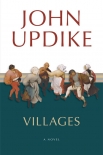Villages, John Updike [brene brown rising strong .TXT] 📗

- Author: John Updike
Book online «Villages, John Updike [brene brown rising strong .TXT] 📗». Author John Updike
Vanessa was a bit younger than he—she had been an underling in his Hartford office—and had a brusque, ageless quality, moving too purposefully to count the years. Her plain, androgynous face, tanned by the sun in every season—for she was a keen skier as well as golfer, tennis player, and gardener—was exceptionally frontal; that is, where Owen thought of Henry as always in profile, preoccupied and heading off somewhere, Vanessa looked people in the eye, as if daring them to blink or smile in nervousness. With the same faintly challenging authority, she ruled the several town committees she served on, as well as her bridge circle and the Garden Club. She was an impressive sight in her own garden, gloved and long-sleeved in protection from rose thorns, up to her trousered hips in delphiniums and phlox and well-staked peonies, a loosely woven straw hat throwing her watchful, unsmiling face into a shade evenly speckled with sunlight. The flowers, it seemed to Owen, softened her, adding a feminine element missing in her confrontational gaze, blunt manner, and husky tenor voice. The Slades were a one-child couple, which made them unusual, and hinted at something foreclosed and firmly settled in their marriage. The child was a solemn, olive-skinned boy, Victor. Amid the many couples the Mackenzies had come to know in Middle Falls, the Slades were not unusual in that the man of the couple was a comic figure but the woman was not. The women had competence, mystery, and at least a hint of beauty. Vanessa was not beautiful—she hardly bothered with makeup, and her upper teeth, like Owen’s own, had come in crowded, pushing her eye teeth forward—but she was dignified and matter-of-fact. How matter-of-fact Owen did not realize until she came to sit beside him on an antique two-person sofa covered with striped satin—a love seat, they used to be called—on the fringe of an improvised dance floor at a party given by the couple, Dwight and Patricia Oglethorpe, who had bought the old Dunham place. Vanessa seated herself and said to him, keeping her voice low, “We ought to have lunch some time.”
Too startled to stall, Owen asked, “Why?”
She gave a slow, constrained smile at this gaffe. Vanessa’s uneven teeth had led to a curious source of power, the rarity of her smile. “There’s usually only one why, isn’t there? To see if we want to have lunch again.”
Stalling now, distracted by the sight, not ten feet away, of his tall, long-necked wife dancing with Vanessa’s hunched-over, rhythmless husband, he asked, “Is that the way things are done?” Phyllis was gazing stoically over Henry’s head; Heaven knew what she was thinking.
Vanessa expressed impatience with a stab of her cigarette, an extra-long Pall Mall. “Owen, why do you always play innocent? You’re not innocent.”
“No? I still feel I am. How do you know I’m not?”
“Everybody knows, you silly.” Her mannish voice became gruff. “Don’t put me on, or we won’t get anywhere.”
“You mean Faye?”
“After Faye, more. Faye was a starter. We all need a starter.”
“You too?”
Vanessa said nothing, just inhaled smoke and let it cascade from her nostrils, above her slow smile. He began to see her—her small neat cat’s nose; her thick dark eyebrows, unplucked, level above her eyes; the crowded mouth tweaked at the moment by a smile in spite of herself. He felt abruptly admitted to a too-large intimacy, in which he was in danger of merely rattling around. He said, to say something and seizing on what lay uppermost in his mind, “I suppose you wonder how could I have ever looked at anybody but Phyllis, who’s so lovely.”
“We know you think she’s lovely, it’s rather touching. And I suppose she is, but she’s not my type, frankly—too bluestocking. She never left school. But nobody around here wonders about what you mentioned. She doesn’t give you shit. Or anybody else, really, except her children, up to a point. She is about





Comments (0)